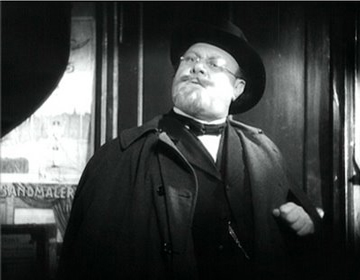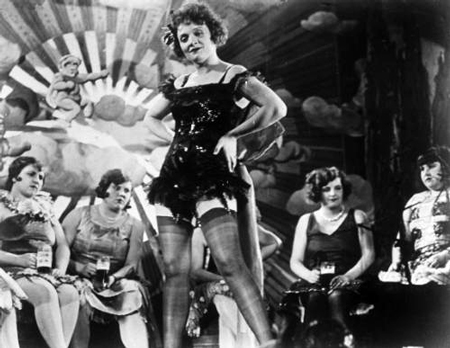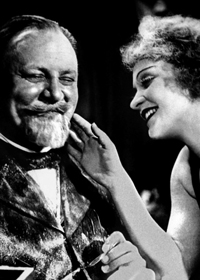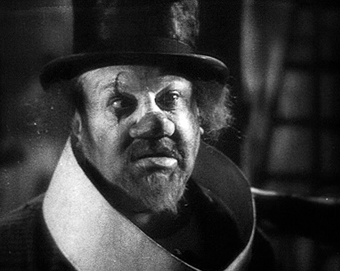
 |
|
|
|
Kino's Blu-ray of The Blue Angel is a welcome opportunity to see the original German-language version of this core world film classic in a good presentation. Josef von Sternberg's tale of romantic degradation was never difficult to see, but impossible to see intact. 16mm prints in high school and college were Nth-generation eyesores with blurry subtitles that didn't match the words being spoken on screen. The main titles were replaced. At least one copy I showed in the UCLA dorms dropped the film's tragic finish, ending instead on a suspicious sequence of Marlene Dietrich doing a reprise of her main theme song. I remember understanding the story only after reading a published film script -- which itself apparently did not reflect the original version. At the UCLA film school another wrinkle entered the mix. The then-new UCLA Film Archive had custody of Paramount's nitrate film collection, which included a perfect copy of the English-language version of the movie. The clarity of the images made the 16mm German copies look like mud. But the whole feeling of the film was different. Seeing Marlene Dietrich stumble through her English dialogue took the edge off her exoticism. Even the song lyrics were in English. The editing wasn't nearly as careful, nor were the performances. Some of the sexual attitudes were toned down as well. We were told that the English Blue Angel premiered in America only after Paramount's Morocco, with its crash diet-altered Marlene, had made its impact. 
"Mr. Artistic" Josef von Sternberg was not a popular filmmaker with his crews but his personal photographic style set the tone for Paramount's house "look" of the 1930s. His melodramas The Last Command and The Docks of New York soaked the silent screen in atmosphere. Nightclub scenes packed the frame with smoke-filled décor and shadowy figures. Acclaimed German actor Emil Jannings came to Hollywood and worked well with von Sternberg; when sound arrived von Sternberg went to Germany for the opportunity to work for producer Erich Pommer, the man behind the most artistically astute films coming out of that country. At the Ufa studios von Sternberg met the ambitious actress Marlene Dietrich, one of the century's most intoxicatingly attractive women. Equally at home as a housewife or a Weimar vamp, the married Dietrich carried on a passionate love affair with the demanding director. He apparently found in her the perfect love object for the movies he wanted to make. She no longer lost plum roles to stars like Brigitte Helm and Louise Brooks. The Blue Angel is the "old story" of a man brought low by passion. Middle-aged and inexperienced in love, Professor Immanuel Rath (Emil Jannings) is considered an old fool by his students. Most of them frequent The Blue Angel, a portside music hall that books attractive and available showgirls. The pompous Rath deludes himself that he projects an authoritative image. He catches his boys with racy photos of the sexy attraction Lola Lola (Marlene Dietrich) and goes to see for himself. Patronized and bamboozled by showman Kiepert (Kurt Gerron), Rath is fascinated by Lola Lola. The knowing showgirl toys with him but not in an unkind manner. Rath responds by falling deeply in love. Unaware that Lola Lola takes casual lovers, Rath 'defends her honor' against a drunken sea captain. News reaches his schoolmaster, and Rath's career as a teacher comes to an end. Lola Lola laughs out loud at his proposal of marriage but accepts, as he's genuinely sweet. Now a part of Kiepert's road company, the professor slips into a fog of contradictory emotions. He wants Lola Lola all to himself but must sell photos of her to earn his keep. Kleipert finds humiliating ways to work him into the act. Lola Lola begins to realize that Rath is a liability to her freewheeling lifestyle. Kiepert sees a big opportunity when the company is re-booked into The Blue Angel: he can promote Rath as the town's own famous native son. Shamed, dazed and confused by his utter loss of self-respect, Rath allows himself to be costumed as a clown, to be the idiot-patsy in one of Kiepert's comedy routines. His humiliation goes too far when Lola Lola takes the handsome new strongman Mazeppa (Hans Albers) as her lover. In the middle of his pathetic performance, Rath sees them on one side of the stage, kissing. The Blue Angel is yet another permutation of the conservative notion that Women are the Root of all Evil. German literature, plays and films returned frequently to stories of heartless vamps and monsters that destroy decent men. Misogynistic fantasies like Alraune promoted the idea that man-killer women have no souls. G.W. Pabst's classic Pandora's Box aimed to temper the notion of a predatory female by making its heroine Lulu an innocent who falls prey to the desires of men; it wasn't popular when new. Unfortunately for Ms. Brooks, the film only led to other movies about women taking terrible punishments simply for being desirable. 
Note that the tempting sex-object women in these stories are given names that evoke the sensation of sex - Lulu, Lola Lola. The character in Heinrich Mann's book had the less erotic-sounding name Rosa Frölich. Production Code movies so accustomed us to films about Fallen Women with Hearts of Gold that audiences may have believed that low dives are frequented by. Fritz Lang was once forced to put a sewing machine in Joan Bennett's tiny London room, to give her an acceptable occupation. Josef von Sternberg's Docks of New York was pretty honest about the reality of the low life on the wharf, but at Ufa he was allowed to fully investigate the subject. This is of course is a big source of fascination in The Blue Angel. The gaudy stage has a row of cheap, tubby-looking showgirls (who really look like dullard prostitutes), only two or three of which try to sing. Some of them look stone drunk. Lola Lola is the main attraction, the girl whose image is on the postcards cherished by the schoolboys. She leers at the audience and belts out suggestive lyrics between gulps of beer. Lola Lola's her costumes are unbelievably tacky. Skirts are under-wired to stand up in front or back, revealing her underwear; a foolish half-hoop skirt is meant to show a backlit silhouette of her legs, and to reveal that she's only wearing silk knickers when she turns around. Lola Lola doesn't have to move suggestively. She stands with her legs wide, her hands on her hips, proudly proclaiming her freedom to be a sex object. For all I know the nightclub in The Blue Angel is also a von Sternberg fantasy that never existed. Who cares? Fans familiar with Marlene Dietrich's Hollywood work are surprised to see her in the role of Lola Lola. Not yet the sleek creature with the hollow cheeks and painted eyebrows, Dietrich is 5' 6" of warm, inviting femininity -- with torpedo-like thighs and a plump, well-fed face. Although it is clear that Lola Lola sleeps with Professor Rath -- that doesn't form a particularly glamorous image -- her seduction of him is priceless. She tells him that he's handsome, and when he beams with shy approval she begins cooing and purring and pinching his face as if he were a baby. German never sounded this erotic in language class -- it's as sexy as hell. Marlene Dietrich would later become a much more polished performer, but the natural appeal of this Berlin seducer was never stronger. 
Rath can't possibly hold Lola Lola, so we aren't surprised when the Professor's life descends into a nightmare. At his wedding he plays the rooster to Lola Lola's hen, making cock-a-doodle-doo noises that will later become the screams of a cuckold. Although everybody in Kiepert's troupe is 'normal', we can't help thinking that Rath has joined the ranks of a group of Freaks: "gooble gobble, one of us!" The troupe's clown constantly interrupts Rath with plaintive stares, before moving on in the crowded backstage spaces. The clown is of course another harbinger of doom. Prof. Rath eventually takes his place, just as Tyrone Power becomes the Geek in the equally horrifying Nightmare Alley. Director von Sternberg skillfully leads us to the moment when Lola Lola and the strongman Mazeppa engage in a brazen kiss, right where Rath can see. Mazeppa is forcing the issue; they've already been up in her bedroom together and Rath's only reaction was to fall more deeply into silent confusion. Watching the pitiful Rath broken into pieces by his hard experience is riveting drama. Memories of Jannings' doorman anguished at losing his social station in his earlier The Last Laugh come to mind, as Rath throws away his social station. The unpleasant truth is that he was a highly ineffective teacher anyway. Von Sternberg's final shot is an inexplicably tender image of Doom. Von Sternberg's film refuses to insist on a punitive moral, despite the tragedy that results when Rath falls in love with the wrong woman. The song lyric goes as follows: "Men flutter to me like moths around a flame, but when their wings burn I know I'm not to blame." Lola Lola makes her living by exciting men and presumably sleeping with some of them, but they come to her. She's a free agent, smart enough to realize that she must hold something in reserve: most women in her profession are cruelly mistreated. She gives Rath every opportunity to leave. She marries him because it pleases her, not for the usual reason that he has money. With his misplaced chivalry and emotional defenselessness, Rath is a disaster waiting to happen. When she cheats on him with Mazeppa, the only person even remotely surprised is the clueless Rath. The cruel students in Rath's classes easily steer him to punish the teacher's pet. Covering his chalkboard with insulting drawings, they're perfectly happy to see their teacher lose his job. Lola Lola treats the foolish Rath with more kindness than he has a right to expect. 
Dietrich runs away with The Blue Angel, even though it is structured as Emil Jannings' star vehicle. Also standing out in the cast are Kurt Gerron and Rosa Valetti, familiar faces from Weimar cinema. Valleti had owned and performed in nightclubs and sings part of a song. Gerron's personal story is horrifying. The Nazis allowed him to keep working, fitfully, right up until the war began. He was eventually given the job of making a propaganda film falsifying the treatment of Jews in 'detention camps'. Gerron thought he might help improve conditions for his captive actors, but promptly after the film's completion the Nazis sent both him and his wife to be murdered in Auschwitz. Emil Jannings became a fervent Nazi; if you recall, he's represented (and apparently incinerated) in Quentin Tarantino's Inglorious Basterds. Marlene Dietrich joined the German expatriate community in Hollywood, renouncing everything Nazi and Hitler. Original author Heinrich Mann was the older brother of the celebrated Thomas Mann. His criticism of Germany led to his leaving the country during the 1933 exodus of leftist artists and intellectuals. Mann was a special focus of Nazi book-burnings, including his book "Professor Unrat". Kino Classics' Blu-ray of The Blue Angel is a very good transfer of film elements in acceptable condition. The image quality is finally good enough to resolve "blurred" scenes as actually filmed through diffusion filters. The occasional soft haloes around backlit objects are an intentional visual effect. In other words, the picture now looks more like other von Sternberg classics, his late silents and the Paramount-Dietrich classics. Unlike American studios that forced European talent to adapt to house styles, Ufa's Erich Pommer encouraged von Sternberg to bring his personal style with him. We also get a better chance to appreciate the fairly primitive soundtrack, which nevertheless picks up Dietrich's natural murmuring as she teases Jannings. The antique sound of the music is charming. Editorially, the sound work is nowhere near as sophisticated as in Fritz Lang's "M". it's still distracting to have loud background noise from the club disappear entirely the moment someone closes the thin door to Lola Lola's dressing room. Kino's Blu-ray carries no extras, which is a shame, as the Murnau Stiftung has been providing incredibly detailed documentaries to go with some of its Murnau and Lang silent films. The celebrated music by Friedrich Hollaender sounds better than ever. Dietrich's saucy tunes became a part of her later repertoire, where she sings them in a more melodic manner; in the movie it just sounds like she wants to arouse her male audience with a raw come-on. The main ballad is showcased in a different light. Known here as "Falling in Love Again" it has much more power with its German lyrics: "Ich bin von Kopf bis Fuß auf Liebe eingestellt". Kino's (or the Murnau Stiftung's) subtitles don't translate this properly: "I am from head to toe ready for love." Hollaender would follow Dietrich to Hollywood, where he continued to collaborate with her while composing the music for dozens of films. This 107-minute version of the film bears signs that Ufa may have re-cut the picture to capitalize on its "hit" song, sung to Jannings by Dietrich in her top hat. The main melody is repeated twice, with other takes and almost identical music, as if to stretch the song out. The ending with Rath sneaking back to his old classroom is intercut with another reprise of the signature song. This time Dietrich sings in front of a plain curtain background, as if it were filmed after von Sternberg's departure. Does Dietrich's face already look thinner in those shots? As Rath passes a prostitute on the way to the nightclub, we also hear a bit of "The Faithful Hussar", the old folk tune sung by Suzanne Christian (Christiane Kubrick) at the end of Paths of Glory. It's interesting, the details that stick in the mind after seeing a truly classic film.
On a scale of Excellent, Good, Fair, and Poor,
The Blue Angel Blu-ray rates:
Reviews on the Savant main site have additional credits information and are often updated and annotated with reader input and graphics. Also, don't forget the 2011 Savant Wish List. T'was Ever Thus.
Review Staff | About DVD Talk | Newsletter Subscribe | Join DVD Talk Forum |
| ||||||||||||||||||